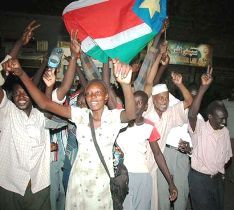Southern Sudanese celebrate peace deal in streets of capital
KHARTOUM, Sudan, Dec 31, 2004 (AP) — Southern Sudanese took to the streets of the capital Friday, singing and waving rebel flags as government and rebel officials signed deals to usher in an end to a generation of civil war.

|
|
File photo showing Sudanese from the South and the North celebrate in the streets of Khartoum the signing of the peace protocols on Thursday May 27, 2004. (AP). |
The bold display of southern sentiment, unusual in this tightly controlled capital city, came as negotiations in neighboring Kenya between southern rebels and the government led to Friday’s signing of a plan to implement an agreement to end the 21-year war.
The final peace agreement is expected to be signed in early January in the Kenyan capital, Nairobi.
“The peace deal is the beginning of real independence from Sudan,” said Qamar Hasan al-Taher, a member of the Sudan People’s Liberation Movement, the main southern rebel group, said in Khartoum Friday, the eve of the anniversary of Sudan’s independence from Britain in 1956. Sudan has been embroiled in a series of civil wars for most of its independence.
Thousands of southerners paraded through Khartoum’s main street, singing and shouting: “Welcome to the new Sudan” and “Welcome to the Sudan People’s Liberation Movement.”
The SPLM’s green, black, red, white and blue flag with a golden star in the center appeared for the first time on Khartoum’s streets. Demonstrators’ songs were blared on loudspeakers.
Some northerners also joined the peace celebrations. Police did not intervene.
But as the signing ceremony started, most revelers vanished from Khartoum’s streets and crowded around television sets inside homes, restaurants and cafes to watch the historic event.
Some set TVs up on sidewalks to watch the signing of the agreements, which include protocols to share power and natural wealth, what to do with armed forces during a six-year transition period, and on how to administer three disputed areas in central Sudan.
“Peace is a popular demand,” said Abdullah Gomaa, a 28-year old southerner living in Khartoum.
Previous gatherings of southern Sudanese have been confined to university campuses, and public displays of loyalty to the rebel movements are rare in Khartoum.
The north-south war has pitted Sudan’s Islamic-dominated government against rebels seeking greater autonomy and a greater share of the country’s wealth for the Christian and animist south. The conflict is blamed for more than 2 million deaths, primarily from war-induced famine and disease.
A separate civil war in the western region of Darfur, where most Sudanese of both Arab and African origin are Muslim, began when rebel groups took up arms in February 2003, citing what they saw as years of state neglect and discrimination against Sudanese of African origin.
The government is accused of backing Arab tribal groups who have pursued a scorched earth policy against African villagers in Darfur, sparking a massive humanitarian crisis.
